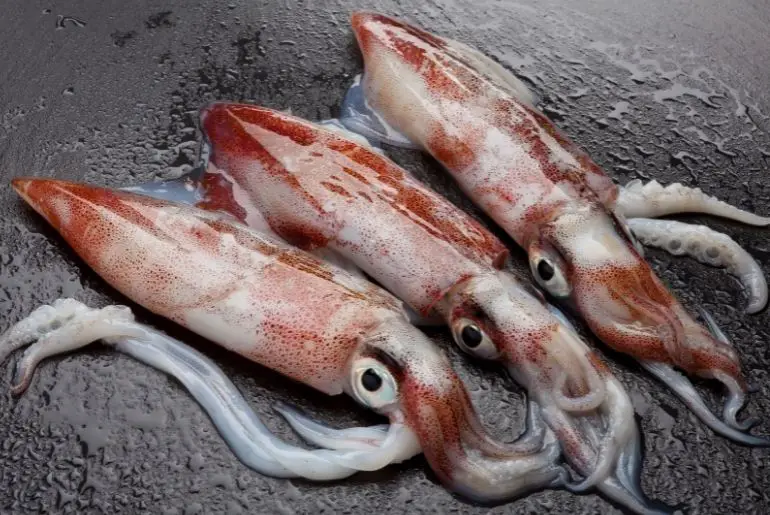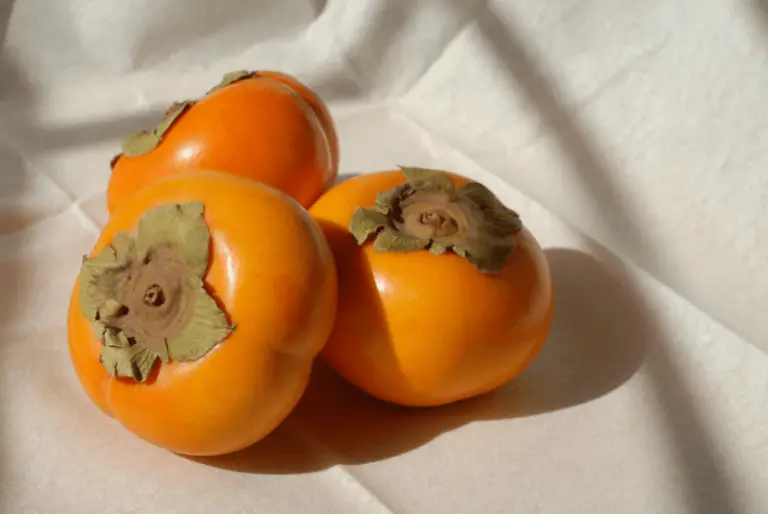Can Cats Eat Squid? (Is it Safe for Cats)

Yes, squid is non-toxic to your cats. But the fried squid, raw and undercooked squid, are not safe for kitties. If you want to offer this seafood to your furry pet, make sure to give only plain boiled squid. Squid comes with plenty of zinc, and it is a vital mineral for cats as well. But excessive quantities of zinc could be dangerous.
Below you can find detailed information about how to feed squid, its nutritional value, benefits, and dangers for cats.
Contents
Can Cats Eat Squid?
Squid is non-toxic to your furry pets. Eating them in small amounts would not have any adverse effect. But squid is not a necessary part of the cat’s diet. Besides that, your felines do not get any nutritional benefit from squid except zinc mineral.
Squid can be dangerous to cats in many ways. In the raw form, squid may have some type of bacteria, such as salmonella, vibrio, listeria, or clostridium. They can cause foodborne diseases or can lead to food poisoning in cats.
The fried squid contains oils and harmful seasonings, which are dangerous to your cat’s health. As for dried squid, it comes with excess salt levels and has a high carbohydrate content.
Plain cooked, steamed, and boiled is the safest way to offer squid to your furry friends. Make sure to feed only tiny pieces of boiled squid to your cat because there is a chance of choking hazard.
Can Cats Eat Raw Squid?
First of all, you should never feed raw squid to your furry friends. It is because these raw squids might contain bacteria that can lead to foodborne diseases. This illness can cause vomiting, diarrhea, and even organ destruction if eaten for a long time.
Another risk of raw squid is that they might break down the Thiamine, also known as vitamin B. This vitamin is very crucial for your feline’s health. Thiamine is an essential element, and it promotes brain function in the furry pet. Besides that, it can also metabolize the carb content to provide energy for your kitty’s body.
When the Thiamine is broken down, it can result in mobility troubles and seizures. Plus, your cat tends to experience several neurological issues. Other problems are difficulty while walking and lack of body balance.
Squid might contain many parasites, bacteria, heavy metals, and a few other harmful elements. Raw squid does not have any dietary fiber content.
Is Fried Squid Bad For Cats?
Fried squid is also known as calamari. It is never a good way of feeding squid to your felines. Fried squid can be dangerous because they are made using oils, which increases the overall calorie and fat content.
Fried squid will have seasonings and extra garnishes, which are mostly garlic or excess salt. Even small amounts of garlic are toxic to cats. [1] Excessive quantities of salt are not safe for the cat’s health.
Some squid might also have artificial ingredients for enhancing the flavor, color, and taste. In short, all these ingredients are not safe and cause harm to your cats.
Can Cats Eat Dried Squid?
Dried squid is very dangerous to your furry friends. First of all, let’s get to know how and with what dried squid is prepared. After skinning, boiling, and cooling the squid for some time, the seasoning will be added to the squid.
Manufacturers will also add extra seasoning to the dried squid. The typical additives in dried squid are salt, sugar, artificial sweeteners, sorbitol, MSG, and organic acid.
Dried squid comes with preservatives, additives, excess sodium content, and other artificial ingredients. All these items are either unsafe or toxic to your furry pets. Due to this, do not feed dried squid to cats.
Are There Any Benefits Of Feeding Squid To My Cats?
There is one primary benefit of giving squid to your furry friends. Squid is rich in zinc, which is one of the crucial elements for cats. This mineral can promote healthy skin and maintain the shiny coat of your furry friends. Plus, zinc has a vital role in the reproductive function of female kitties.
Excess quantities of zinc can result in zinc poisoning, which leads to trembling, lethargy, and a lack of appetite in felines. [2] In extreme cases, it can also cause the death of your cat. But feeding one or two tiny pieces of squid occasionally is not harmful.
Brief Nutritional List Of Squid
In every 100 grams of raw squid, the nutritional value is as follows:
- Water – 78.6 g
- Energy – 92 kcal
- Protein – 15.6 g
- Calcium, Ca – 32 mg
- Zinc, Zn – 1.53 mg
- Copper, Cu – 1.89 mg
- Magnesium, Mg – 33 mg
- Phosphorus, P – 221 mg
- Potassium, K – 246 mg
- Sodium, Na – 44 mg
- Selenium, Se – 44.8 µg
- Vitamin A, IU – 33 IU
- Total vitamin C (ascorbic acid) – 4.7 mg
- Choline – 65 mg
- Ash – 1.41 g
- Carbohydrate – 3.08 g
- Cholesterol – 233 mg
- Total lipid (fat) – 1.38 g
- Total saturated fatty acids – 0.358 g
- Total monounsaturated fatty acids – 0.107 g
- Total polyunsaturated fatty acids – 0.524 g. [3]
What Are The Potential Risks Of Eating Squid To Cats?
Like other seafood, squid also might contain marine toxins. These toxins will remain there if not cleaned properly. So when your cat has eaten this squid, the toxins will also enter the cat’s body resulting in food poisoning.
Remember that seafood poisoning causes more severe conditions than typical food poisoning. Squid poisoning can result in neurological troubles, such as numbness and lack of coordination in extreme cases. Some gastrointestinal problems are also a few outcomes.
The boiled squid comes with a rubbery texture which increases the risk of choking. If your furry pet tries to swallow the whole squid, it might obstruct the throat or stomach. Besides that, the squid slices could get stuck between the cat’s teeth.
Are Cats Allergic To Squid?
Some felines are allergic to squid because it comes under the seafood category. In general, seafood allergies are common in your furry pets. If you are feeding squid for the first time to your cat, give only one or two small pieces. After that, keep an eye on your cat for at least 24 hours to detect any of the following signs:
- Diarrhea
- Vomiting
- Skin discomforts
- Itchy or scratchy skin
- Upset stomach (gurgling sound from the cat’s stomach)
- Stomach pain and other gastrointestinal problems
- Other symptoms of being sick
No matter whether their reaction is mild or severe, if your cat shows any of these symptoms, do not feed squid again.
Can Kittens Eat Squid?
No, do not ever feed squid to kittens. First of all, the regular diet of kittens should be their mother’s milk, which contains all the nutrition needed for them.
Second, baby felines do not have a proper and developed stomach. Because of that, they can not digest squid and will face digestion problems.
Third, it is clear that you should not feed fried and raw squid to cats. So you can only offer boiled squid to kittens. But this boiled squid has a sticky and jelly-like texture which can cause choking hazards.
Fourth, if you feed squid to your growing up kittens, they might develop an addiction towards it. This circumstance will make them picky eaters. Overall, squid is neither beneficial nor safe to kittens in any way. Due to that, avoid feeling squid to young kitties.
Conclusion
Squid is great seafood and is non-toxic for your furry pets. But it is not the best dietary option for cats due to its possible dangers. This squid is a rich source of zinc, which is one of the vital nutrients for cats. However, excessive amounts of zinc can be detrimental.
Raw or undercooked squid can cause foodborne diseases. The fried squid or calamari poses a higher risk of weight gain. Boiled and plain squid without any seasonings and the added flavor is best for cats.



![Can Cats Eat Cornstarch? [Risks & Benefits]](https://petcoddle.com/wp-content/uploads/2022/07/can-cats-eat-cornstrach-768x514.jpg)
![Can Cats Eat Dragon Fruit? [risks and Benefits]](https://petcoddle.com/wp-content/uploads/2022/05/can-cats-eat-dragon-fruit-768x514.jpg)
![Can Cats Eat Rotisserie Chicken? [Risks & Alternatives]](https://petcoddle.com/wp-content/uploads/2022/05/can-cats-eat-rotisserie-chicken-768x514.jpg)
